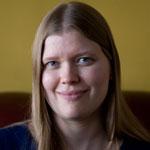About the Author
A Traditional Bio
Linley Erin Hall is freelance writer and editor specializing in science and engineering. Hall has a B.S. degree in chemistry from Harvey Mudd College (Claremont, CA) and a graduate certificate in science communication from the University of California, Santa Cruz. She worked as a science writer for the Ira A. Fulton School of Engineering at Arizona State University before becoming a freelance writer. Hall has written or edited four educational nonfiction books in addition to Who's Afraid of Marie Curie? She also writes articles on a wide variety of science and engineering topics. She lives in the San Francisco Bay Area.
A More Personal Look
As part of my research for Who's Afraid of Marie Curie, I interviewed 94 women, ages 14-81, about their experiences in science and engineering fields. Their stories are an essential part of the book. Here is my story.
I dropped out of science.
My plan was to become a biochemistry professor. I earned a bachelor's degree in chemistry, but even before I finished my degree I knew it wasn't the right path for me.
As a child no one would have pegged me for a scientist. I spent much of my free time reading, started writing a novel at age 12, and served as editor of both my junior high and high school newspapers. But I was also a girl who really loved learning about the world. I remember sitting in the yard, intently watching the insects I uncovered when raking pine needles. Cells and DNA and the biochemical reactions that are essential to life fascinated me.
So when my mother suggested that I find something to pay the bills until I became a famous novelist, becoming a scientist seemed like a good idea. Possibly discovering something important and contributing to the world's body of knowledge appealed to me. I also thought that education was extremely important, and that I could make a difference through teaching. Plus, professors have their summers off, so I could keep writing fiction.
I didn't know any academics when I was in high school. I had no role models. No one could point out the inaccuracies in my ideas about academia.
And so I went off to Harvey Mudd College, the toughest school you've never heard of, intending to double major in chemistry and English. I dropped the English major my sophomore year; since I was on the biochemistry track, which essentially added a bunch of biology classes on top of the chemistry major, I just didn't have time.
The chemistry department at HMC was supportive of female students. About a third of each the students and professors were female. I never felt discriminated against because of my gender. I won awards and scholarships, and did well in most of my classes. I loved learning about science.
But summers doing research taught me that the laboratory wasn't where I wanted to be. I knew a ton about one particular corner of chemistry, but I missed being able to learn about a wide variety of scientific discoveries. Although my perfectionist streak made me good at lab work, I didn't enjoy it very much. I also watched my mentor, an assistant professor, struggle to meet the demands placed on junior faculty. I had no interest in spending my time writing grant applications, sitting on committees, or dealing with departmental politics.
By the summer before my senior year, I had decided I wasn't going to grad school, at least not in chemistry. In a happy accident, I learned about science writing, and I found a way to start writing again without all of my scientific training being for nothing. So I dropped out.
That's the narrow view. My story. But it's part of the larger story about women in scientific and technical fields that Who's Afraid of Marie Curie? tells.
